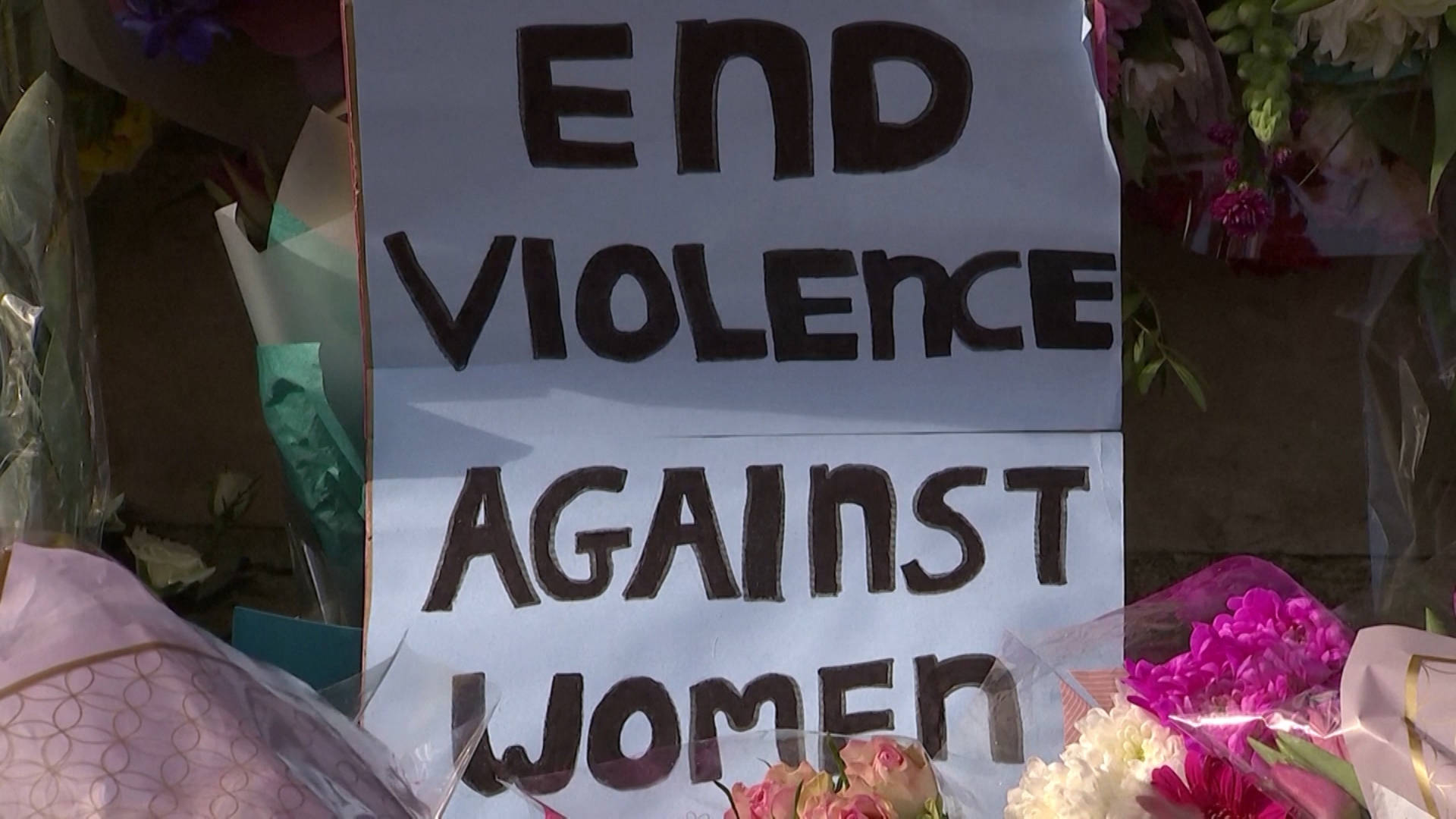
This is a rush transcript. Copy may not be in its final form.
AMY GOODMAN: This is Democracy Now!, democracynow.org, The Quarantine Report. I’m Amy Goodman.
“Disaster patriarchy: how the pandemic has unleashed a war on women.” That’s the headline of a new essay by V, the playwright and activist who was formerly known as Eve Ensler. She details how the pandemic has led to a surge in violence against women, as well as an economic and educational crisis, with tens of millions of women and girls out of work or school. UNESCO estimates 11 million girls may not return to school once the pandemic is over. Other estimates put the total as high as 20 million girls.
In her essay, V writes, quote, “Covid has revealed the fact that we live with two incompatible ideas when it comes to women. The first is that women are essential to every aspect of life and our survival as a species. The second is that women can easily be violated, sacrificed and erased.”
V joins us now from Kingston, New York, founder of V-Day and One Billion Rising. This year marks the 25th anniversary of her play The Vagina Monologues. Her new piece on disaster patriarchy appears in The Guardian.
V, welcome back to Democracy Now! Thank you so much for joining us. Talk about disaster patriarchy.
V: Good morning, Amy, and thank you so much for having me.
Well, I would say Naomi Klein was the first to identify disaster capitalism, when capitalists use a disaster to impose measures they couldn’t possibly get away with in normal times, generating more profit for themselves. I think that disaster patriarchy is a parallel and complementary process, where men exploit a crisis to reassert control and dominance and rapidly erase the hard-earned rights of women.
And I think — I spent months interviewing activists and grassroots leaders all around the world, from Kenya to France to India, to find out how this process was affecting them, and how they were fighting back. And in very different contexts, certain key factors kept coming up. One was that women are losing their safety, their economic power, their autonomy, their education, and they are pushed onto the frontlines, where they are often used, unprotected and sacrificed. And I can sort of break that down, if you want me to.
I think if we look at intimate terrorism, otherwise known as domestic violence, has really turned home into a kind of torture chamber for millions of women around the world. I mean, we did a conference recently in France, where domestic violence is out of control. We’re seeing the same numbers in the U.S. RAINN was reporting, for example, that their hotlines have never been so busy. The same is true in Mexico. The same is true, really, in every country that I interviewed. And I think it’s a combination of people feeling really severe economic insecurity, excess of alcohol, and this confinement has just made a perfect storm for abuse. It’s hard, really, to determine, Amy, what is worse: the fact that men in 2021, thousands of men, still feel willing and entitled to control, torture and beat their wives and girlfriends and children, or that no government actually thought about this in thinking about their plans for lockdown.
And I think we’re also seeing just the outrage that is added to that, that many governments have reduced funding for shelters at the exact moment they were most needed — very true throughout Europe and the U.S. In the U.K., providers have said that the crisis has exacerbated a lack of access to services for migrant and Black, Asian and minority ethnic women. And organizations working with those communities say that persistent inequality leads to additional difficulties in accessing services such as education, healthcare and disaster relief remotely.
Then, if we look at jobs, OK, in the U.S., more than 5 million women’s jobs were lost between the start of the pandemic and November 2020, because much of the work that women do requires physical contact with the public — restaurants, stores, child care, healthcare settings. Those were the first to go. And then, again, there’s the lack of child care options, which have left many women unable to return to their jobs. By the way, having children does not affect men at all in the same way. And the rate of unemployment, for example, for Black and Latino women in the U.S. was high before the virus, but it’s now even higher. And that situation is amplified in countries like India, where an activist there told me that 39.5% of women there had lost their jobs.
Then there’s the idea of working from home, where women’s personal space has basically disappeared. Their workload has increased triplefold. I don’t think we can overstate how exhausting, how overwhelming the pandemic has been for women, who really are not getting a break in any direction.
And we know that when women are put under greater financial pressure, their rights erode. You know, I was talking to women who were talking about the struggle to pay their rent, that they were being preyed upon by landlords, and there’s a new process known as “sextortion,” where landlords are insisting that women have sex with them in order to pay their rent.
And then, as you were saying earlier, and this is really disturbing to so many activists that I talked about, and I think it will have maybe the largest impact, is how many girls may not return to school. As you said earlier, between 11 and 20 million is the estimates. And I think this will be hugely, hugely problematic, because we know that when girls are educated, they know their rights, they know what to demand, and they have the possibility of getting jobs and taking care of their families. And when they have access to education and they don’t have that access, they become a financial strain, and they’re forced into early marriages. They’re sold off. Sex trafficking becomes much easier.
I talked to one of our activists in Kenya who’s been fighting to stop female genital mutilation there for over, you know, nearly 15, 20 years. And she said the pandemic has pushed girls back into their homes. They don’t even know what’s happening inside those homes, because they don’t have access to those girls. And we know when girls are cut, when they’re female genitally mutilated, they no longer have access to education.
AMY GOODMAN: Yeah, I want to just bring in Malala Yousafzai’s voice here, UNESCO predicting what? Eleven million — saying 11 million girls have left school, could be as high as 20 million not returning. Malala Yousafzai is the winner of the 2014 Nobel Peace Prize. In 2012, she was shot in the head by a Taliban gunman who boarded her school bus. She survived serious wounds, now continues to campaign around the world for girls’ education. Here she’s urging girls to return to school as soon as it’s safe.
MALALA YOUSAFZAI: Whether your school is open or not, I hope you will do whatever you can to keep learning. Even though it may have been many months since you have been to school, don’t lose hope and don’t give up on your education. I know you have dreams and ambitions, and I believe you can make this world a better place. It all begins with education. So go back to your school as soon as it’s safe.
AMY GOODMAN: Again, that’s Malala Yousafzai, the Nobel Peace Prize winner. V, continue, as you talk about the ground women and girls are losing, and then what is being done, how people are resisting this, and what you think also governments need to do.
V: Well, I think the last area I want to really talk about is what’s happening to frontline workers everywhere in the world. And during the pandemic, I was really honored and privileged to have a frontline seat to what’s happening to nurses in America. I worked with National Nurses United, as you know, one of the biggest and most effective and radical nurses’ unions in the country. And I interviewed many nurses on the frontline. As a matter of fact, we created this beautiful piece called That Kindness, out of those nurses, which was done at Brooklyn Academy of Music and then traveled across the country. And I watched for months as —
AMY GOODMAN: V, before you go on, I just wanted to play a clip —
V: OK, great.
AMY GOODMAN: — from the docu-play, That Kindness: Nurses in Their Own Words, based on those interviews you talked about with nurses early on in the pandemic, the play produced in partnership with the national nurses’ union. This is actor Dale Soules.
DALE SOULES: We’re not expendable. My family is not expendable. My husband is not expendable. My grandchildren are not expendable. My daughter works in the COVID unit. She goes straight home and showers immediately. She leaves her shoes outside, goes and showers, doesn’t touch her kids, doesn’t touch you, but goes and showers and packs her clothes so that they don’t get exposed to what she was exposed to during the day. We have a saying in NNU: “You save one life, you’re a hero. You save a hundred lives, you’re a nurse.”
AMY GOODMAN: An excerpt from the docu-play That Kindness, made with National Nurses United. V, continue.
V: Well, I love that last little line. It’s so brilliant.
But, you know, so, I watched for months, as we all did, nurses having grueling 12-hour shifts, making agonizing choices and just acting as midwives to death, having to choose between who lived and who died. And then, on their short lunch breaks, they had to protest over the fact that they had no personal protective equipment, which put them in even greater danger. I mean, we witnessed women wearing garbage bags for months, instead of gowns, and reusing masks that were infecting them, and being forced to stay on the job with fevers. You know, in the same way that no one thought what it would mean to lock women up with children and women in houses with abusers, no one pre-thought what it would be like to send nurses into an extremely contagious pandemic without proper equipment. And that is a form of violence.
Then again, I’ve talked to warehouse workers who — packing and shipping with no protections, women who worked in poultry factories, who were forced to work in close proximity, who had fevers, who were forced to keep going on the job.
And then, you know, I have worked for years with One Fair Wage. I just did a demonstration with them last week. Their salary is still $2.13 an hour, which it has been for the last 22 years. And now there’s a new development called “maskular harassment,” which is that men are insisting women who are wearing masks, who are waiting on them, pull down their masks so they can look at their faces to determine if they’re pretty enough to get a tip. OK, these are just horrible notions and things that are escalating throughout the pandemic.
I spoke to women farmworkers in this country, Mily Treviño-Sauceda at Alianza, who tells me that female farmworkers have been — have more incidents of pesticide poisonings, sexual abuse and heat stress, because nobody is watching and no one has their eyes on them to protect them.
And I think, in the end, as you said at the beginning, what COVID has revealed is that patriarchy is here. It hasn’t gone away. It rises in disaster. And if we don’t really address it now, if we don’t say that we have to take it on full head as a system, that is literally ruling and controlling our destinies throughout the planet, we’re going to be spinning our wheels forever.
AMY GOODMAN: And so, the resistance that people are organizing around the world — and you have always been a leader of that, talking about V-Day and the 25th anniversary of The Vagina Monologues — you’re calling for a global initiative on the scale of the Marshall Plan to deconstruct, to exorcise patriarchy.
V: I think it’s so critical. I want to say that I think one of the things, before I just get to addressing that — it’s been so moving to see how many women are rising in the face of everything that’s going on, in spite of risk of infection, in spite of poverty, in spite of horrible conditions in their communities. I mean, we saw, in One Billion Rising this year, thousands of women rising. Our theme was One Billion Rising Gardens. Women planted gardens. I think there were 10,000 gardens that were planted, 9,000 — and in India, for example, across the whole country, but all over the world, women rose, women fought back, women stood up to governments, women demanded all kinds of protections, in spite of the risk to their lives.
But I want to say, I’ve been doing this work for so long, 25 years and longer, every day, day in and day out. And if we don’t really get to the root of what patriarchy is, we will be here forever. So I really am envisioning this large global initiative to deconstruct and exorcise patriarchy, that would — first we’d have to acknowledge it, that it’s the root of so many other forms of oppression, from imperialism to racism, from transphobia to the denigration of the Earth. And then there would be an ongoing education, public forums, processes, studying how patriarchy leads to those forms of repression. We would use art to expunge trauma and grief and anger in the culture and help people heal and make people whole. And we would understand that a culture that has diabolical amnesia, which is certainly this country, and refuses to address its past can only repeat its misfortunes and abuses. And I think we would have community —
AMY GOODMAN: Five seconds.
V: — and religious centers that — dedicated to trauma. And we would study the arts of listening and empathy and reparations and apology. But we really have to say we need to focus on patriarchy as something real as a system, and we need to dismantle it as a world.
AMY GOODMAN: V, award-winning playwright, founder of V-Day and One Billion Rising. We’ll link to your new piece in The Guardian, “Disaster patriarchy: how the pandemic has unleashed a war on women.” I’m Amy Goodman. Be safe.








